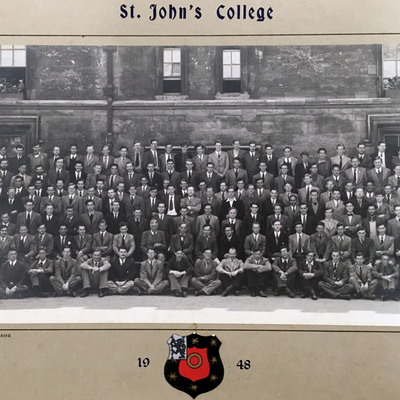Irfan Arif Shahid (formerly KAWAR), 1926-2016, (SJC: 1947-51)
His father was a dentist in Palestine, and Shahid was educated at Government College, Palestine and Durham University, England. He arrived in Oxford on a Palestine Government Scholarship, matriculating at St. John’s in 1947. He read Classics (or Lit. Hum. – Literae Humaniores) and graduated in 1951.
Shahid was an eminent scholar with a distinguished career in Arabic and Byzantine Studies, focussing on the relationship between the Byzantine Empire and Arabs of the 4th-6th centuries. He was Elizabeth Proctor Fellow at Princeton from 1953-4, and took his PhD there. He was in rapid succession Fellow at the Harvard Centre for Byzantine Studies, 1954-5, Rockefeller Foundation Fellow, 1959-60, and a US Government Fulbright-Hays fellow in 1968-9, returning to Harvard for another Fellowship in Byzantine Studies, and being appointed Professor of Arabic at Georgetown University, Washington D.C. in 1973. He was the first holder of The Sultanate of Oman Chair in Arabic and Islamic Literature at Georgetown From1975-6 he held a coveted Visiting Fellowship at the celebrated Institute for Advanced Study at Princeton.
As a writer and historian, within the context of the historiography of Palestine Shahid is seen by scholars as a member of the “Nabakh” or Naqba generation - who were born and raised in Palestine, and who play an important role in Palestinian history, literature and scholarship, at whose core lie narratives of the expulsion of Palestinians from the homeland.[i] Shahid’s important publications include The Martyrs of NajrAn (1971) and Byzantium and the Arabs, vols. 3 and 4 (1989). Shahid was a member of the American Oriental Society, the American Middle East Association and the American Association of Teachers of Arabic. He remained in the United States and died there in 2016.[ii]
St. John’s has a long
historical connection with Arabic scholarship. Its President from 1611 to 1621,
William Laud (Archbishop of Canterbury, 1633-1645), founded the Laudian
Professorship of Arabic in 1636. Since 1937, when Hamilton Gibb was appointed
to the Professorship (he held it until 1955 when he left Oxford to take up the
Professorship of Arabic at Harvard), the Laudian Professor has been a Fellow of
St. John’s College, and this remains true today, in the case of Julia Bray the
current Laudian Professor. Hamilton Gibb was Laudian Professor and a
Fellow of the College, when Shahid was up at St. John's, reading Classics, from
1947-51. It is possible, even likely, that the two interacted and Gibb may have
tutored Shahid in Arabic, moreover perhaps Shahid’s intellectual and literary
interests, his move to the United States for a PhD soon after Gibbs's arrival
there, and his choice of an academic career in Arabic and Islamic literature,
may have been partly shaped by his time at St. John’s. We have very little by
way of records of Shahid’s time at St. John’s but hope, as ever, persists, and
so does the research!
[i] See Helm et al., A New Critical Approach to the History of Palestine: Palestine History and Heritage Project I (Abingdon, 2019)
[ii] https://www.legacy.com/obituaries/washingtonpost/obituary.aspx?n=irfan-shahid&pid=182500825
